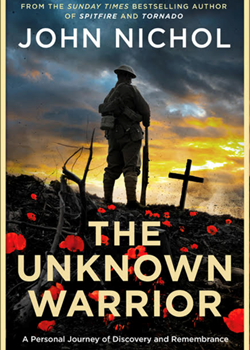The Unknown Warrior by John Nichol
- Home
- World War I Book Reviews
- The Unknown Warrior by John Nichol

Publisher: Simon & Schuster UK (September 26, 2024)
Length: 400 pages
ISBN13: 9781398509443
‘The Unknown Warrior’ by John Nichol has substance—literally and figuratively. You feel its quality the moment you have it in your hand, with its weighty presence, suede-like feel to the dust jacket, and the look and smell of high-quality print. This perfectly matches the exceptional storytelling and research that unfolds within its pages. From the myriad of vignettes imagined to the intricate details woven throughout, the author masterfully guides the reader through stories that provoke thought, evoke tears, and leave a lasting sense of awe and understanding. It is carefully, thoughtfully, cleverly and beautifully written. Indeed, it is the kind of book that, once you begin, you will find it hard to put down.
Nichol weaves together different periods in ‘The Unknown Warrior’ by creating a constant and balanced to and thro between events from the Great War and events from the present. He explores ‘unknown warriors’ from various conflicts, including the First World War, the Falklands, the First and Second Gulf War, and the War in Afghanistan. This approach allows him to draw parallels between the experiences of soldiers and families across time, highlighting the enduring impact of war and the universal nature of grief and loss.
His research is exhaustive, and his storytelling is impeccable, as he brings us to experience his discoveries. The importance of ceremonies, such as commemorations and funerals, becomes undeniably evident. They are not merely rituals but poignant reminders of the lives lost and the horrors endured.
Nichol doesn't shy away from the gore and horror of war; instead, he confronts it with honesty and respect. His vivid descriptions are rich in detail, whether it’s the practical necessity of cooling a machine gun barrel with water during the battle for High Wood in 1916 or the haunting image of shell holes today that, in his words, ‘still leave faint shadows, like footprints in the sand’.
In ‘The Unknown Warrior’, you get to know the men behind the stories as characters vividly brought to life as if in a short film. They each have a character arc that holds your attention; you want to know what becomes of them.
Nichol recounts in one instance, with heartbreaking clarity, how parts of bodies were put in bags; ‘what remained of him was later collected and buried with their comrades’, he writes. In this way, we understand what was meant to be ‘missing’ and how likely it was in the new era of industrial warfare at the start of the 20th century for a person to be broken into smithereens. This is a recurring theme - a reminder of the vulnerability of the human body, seen both in historical conflict and through the lens of more recent wars.
Learning about introducing a second identification disc in late 1916 is just one of the many details that ground this book in the reality of warfare. There are plenty of surprises like this, factoids thoughtfully included in the narrative. These are not just stories of anonymous soldiers; they are deeply personal accounts, made all the more poignant by Nichol's ability to connect past events with present-day reflections. The way he moves between the past and the present is seamless, creating a tapestry that is as intricate as it is moving.
One of the book's most powerful aspects is its exploration of the continuous thread of grief that runs through generations. Nichol draws a clear line from the heartbreak experienced by families during the First World War to the grief felt by modern families who have received that dreaded ‘knock on the door’.
'The Unknown Warrior' brings to life the stories of those who have been lost, sparking memories and reflections that resonate deeply. It is a clever weave of events from the last century with those of 1914-1918 and the machinations that ensured the Unknown Warrior would remain just that. Nichol delves into the human need to remember, honour those who died in service, and maintain the delicate balance between forgetting and honouring.
Nichol's exhaustive research significantly contributes to the effectiveness of his storytelling in ‘The Unknown Warrior’. His meticulous attention to detail allows him to provide vivid and accurate descriptions of both historical and contemporary warfare. This not only brings the stories to life but also grounds them in reality, making the experiences of the soldiers and their families all the more relatable and impactful. Additionally, his research enables him to uncover lesser-known details and personal accounts, further enriching the narrative and providing a deeper understanding of the human cost of war.
As the book draws to a close, Nichol continues to reveal new connections and new resonances that tie the past to the present in surprising and profoundly moving ways. For example, the story of Lance Corporal John Morrison, killed in 1915 and discovered, identified, and buried with full military honours 101 years later, brings the journey full circle. ‘A warrior, no longer unknown,’ Nichol concludes.
The Unknown Warrior is exceptional, insightful, engaging, and unforgettable. My later grandfather and mother would have loved a copy. Please do share your views and recollections 'The Unknown Warrior' triggers for you.
Review by Jonathan Vernon, Digital Editor. Email > digital_editor@westernfrontassociation.com
Join author John Nichol and Tom Thorpe for this Mentioned in Dispatches podcast > The Unknown Warrior





